One of the more chilling passages C. S. Lewis ever wrote comes in The Great Divorce in which he imagines Napoleon in Hell. The excerpt below is a conversation between the narrator and one of Hell's residents:
Login to read more
Sign in or create a free account to access Subscriber-only content.
Topics:
